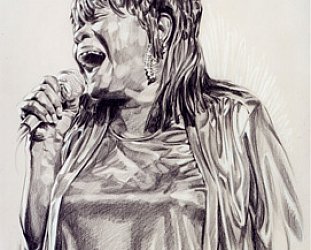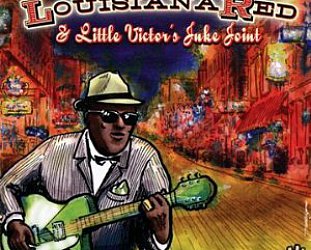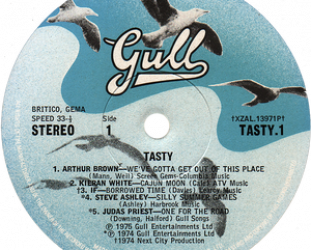Graham Reid | | 8 min read

On a per head of population basis,
Bruce Iglauer – the founder of Alligator Records – has been the
man who has let you hear the real minority stuff.
As he said when we spoke in 1988,
“Getting our artists on to radio is tough. Radio plays young, white
male artists and to get somebody like Koko Taylor - a middle aged
black woman and not particularly glamorous -- on to a station
catering for 20-year old white yuppie males is real hard."
In the global village, Iglauer, head of
the Chicago-based label, is like the guy in the far hut who sells you
music made by a couple of friends.
And he started his record company for
the best of all possible reasons. The music he liked wasn’t being
recorded.
"I started my label in 1971
because the company I was working for, Delmark, wouldn't record Hound
Dog Taylor and the Houserockers, my favourite band. I thought it
would be like a hobby. I knew it was a business when my phone bill
became bigger than my monthly cheque at Delmark."
By '88 Iglauer was heading a label
which had a catalogue of a hundred or so titles and included some of
the classic blues albums of the past 20 years. But it was no less a
struggle today when you consider the small sales, on some albums.
“Back in 1970, Delmark would sell
about two or three thousand copies of an album in the first year, the
Hound Dog Taylor sold 9000 in the first three months, mainly because
I was working radio and press in a way blues hadn't been marketed to
a young white audience before.
"Today an album-like Lil' Ed and
the Blues lmperials would sell about 15 to 17,000 on tape, album and
CD in total. And in order to do that we'd probably give away 3500
promotional copies plus print posters and do press kits.
“The profitability on an individual
record isn’t that great, but certain records like Showdown by
Albert Collins, Robert Cray and Johnny Copeland or Albert Collins’
Icepicker have made us a lot of money.
“They were made with a limited budget
and sold better than expected. Most Alligator records make a small
profit and the big back-catalogue supports the cash flow."
Iglauer started Alligator in 1971 with
$2500 and says the company ran for 10 years before he had to go to
the bank for a loan.
He is unashamedly a businessman –
“I'm a little jaded because I listen with a business ear and think
how can I market them?"-- but still a fan who listens to the
blues for leisure and goes to clubs and concerts regularly.
“I was part of the Great Folk Scare
of the Sixties," he laughs, and was a very amateur jug band
musician who first heard the blues at folk festivals in '66.
"By 1970 I was in Chicago and the
following year I had my own label. It was like heroin, after the
first shot you had to have the second.
“I think of Alligator as a label like
Blue Note, the classic jazz label, where records are supposed to be
on the cutting edge when they're released but also stand up over a
long period. I'm proud of what we've done but I've made mistakes.
“I passed on Robert Cray because
there was a member of the band who, at the time, wasn't a very good
player. I wanted to replace him for the record with a studio musician
and Robert refused. That was it," he says, making clear the
difference of opinion was entirely amicable.
"Robert had gone in a direction I
wouldn't have conceived of and a more successful direction than I
would have taken him."
Iglauer also had the opportunity to
record Stevie Ray Vaughn before the guitarist made the mark he did
but it's clear he is on good terms with all his artists. He is
disappointed when someone like Son Seals leaves the small, personal
roster of Alligator artists.
The label also had a brief flirtation
with reggae but Iglauer let that slip away deliberately.
“I like reggae and that's the reason
anything gets recorded on Alligator. It also fitted with our slogan
of ‘Genuine Houserockin‘ Music' because it’s rhythmic, you can
dance to it, it’s a rootsy black music tradition and it’s also
structurally simple but emotionally complex like blues.
"But frankly my experience with
reggae artists was not a happy one. Koko Taylor and the people on
Alligator know how to say those two magic words - ‘thank you’ –
and I never met a reggae artist who knew those words.
"As the leases expire we're
getting out of reggae.”
Not that Alligator needed to broaden
the base of its recording outside blues. Iglauer pointed to a healthy
blues scene and was excited about the new generation of artists like
Little Charlie and the Nightcats from Sacramento, Tinsley Ellis out
of Atlanta and Kenny Neal, the big news from Baton Rouge, whose
albums he had recently recorded.
Although he received a mountain of
audition tapes – it was August and he is listening to the intake
from March -- it is seeing a band live, as he did with Lil' Ed and
the Blues Imperials which is often the clincher.
Lil' Ed was shortlisted for a
compilation of new blues players on the Chicago scene although
Iglauer said he hadn't heard him with his own band. He caught the
band playing in a club and was impressed by how diverse they were,
pulled them into a studio for the one track and the band blew the
studio away.
The group worked up such a fever on the
one track the engineers just let them go for it and kept the tapes
rolling: “It never occurred to me to make an album with Lil' Ed.
Certainly not to make one in three hours – and we've still got
material from that one session."
The Little Charlie album came through
the more traditional route of an audition tape on the desk, although
Iglauer knew the harp player.
He flew to Sacramento to see the band
play and was impressed by the quality of songs, the humour and
astounded by the versatility of guitarist Charlie Baty. The group
were about to sign to another label but the deal was done on a
handshake and they were on Alligator.
But mountains of tapes are a worry.
“Finding good blues songwriters is
hard and most tapes have familiar songs, familiar-arrangements by
artists trying to sound like familiar people. Ever since I recorded
Johnny Winter I’ve been getting a lot of tapes from people who
think playing a million notes a second is going to get me interested.
“They don't understand the music has
to tell a story, be intense and have humour. Musicians like Steve Vai
and Joe Satriani have technique that would kill any blues player but
technique isn't what interests me. Lack of technique bothers me –
but technique is supposed to make you feel something.
"Also, I like singing. The voice
is my favourite instrument."
Judging by the success of Alligator –
the label celebrated four decades in 2011 – Iglauer made few
mistakes when it came to picking musicians to record, but he was also
acutely aware of who the music is getting to.
Each album contains an insert business
reply card and from those Iglauer can give you an exact picture of
the person who has a few Alligator albums in his collection.
“He's male -- over 95 per cent are
male - average age is 27, usually fairly well educated, at least a
couple of years at university and although we don't ask people how
much they make we do ask what job they do.
"We have, if not a white collar
audience, certainly very light blue.
"This is reinforced at concerts
where we get a lot of weekend hippies and a few weekend greasers.
They buy a lot of records and these days a lot have CD players. In
the States over one third our business is on CD."
Iglauer's company was expanding but it
was still very much a hands on business. He said it wasn't uncommon
for him to go home with a couple of thousand envelopes and stuff them
with the label's monthly mail-out to 5500 record stores while he
listened to audition tapes into the night.
The company, which employs only 17
people at the time, also worked closely with the artists and Iglauer
has been a producer and manager for many on the label.
When it comes to a tour he'll often
accompany an artist. Office staff work out every detail of an
artist’s itinerary down to “what hotel, what time to check out
and what highway to take" because the musicians don‘t have a
road manager.
It has brought the artists and Iglauer
very close which makes the loss of someone like Roy Buchanan, who
hanged himself a fortnight before our conversation, especially hard
to take.
 “Roy was a very complex and troubled
man from the day I met him about six years ago," he said. "He
came from a deeply religious and very poor family - they were
sharecroppers. Roy believed in heaven and hell - and in sin. I think
he perceived himself to be a sinner and somebody who had turned away
from God and, to a certain extent, was therefore doomed.
“Roy was a very complex and troubled
man from the day I met him about six years ago," he said. "He
came from a deeply religious and very poor family - they were
sharecroppers. Roy believed in heaven and hell - and in sin. I think
he perceived himself to be a sinner and somebody who had turned away
from God and, to a certain extent, was therefore doomed.
"He never drank mildly, always to
excess and because his emotions were so locked inside him alcohol
would release these and he could do or say anything. He tried to kill
himself a year and a half ago.
“I hope his death had nothing to do
with what he was doing artistically. He was responsible for a great
number of people -- his wife, children and grandchildren – all of
whom he was raising and so his money was going away as fast as he
earned it And his life was in emotional disarray.
“I'm very sad but I wasn't surprised.
We didn't always communicate well but he was a house-guest of mine
and an extremely gracious man.
"But there was a part of him you
couldn't touch.
"When we were doing the first
album the rhythm guitarist, Chris Johnson, said to him, 'How come you
look so calm and play with all that fire?'
“Roy just looked at him and smiled
that angelic little smile and said, 'Because I'm screaming inside'.
“I think the screaming got out.”
Want to read about another blues label out of Chicago? Then go here.







post a comment